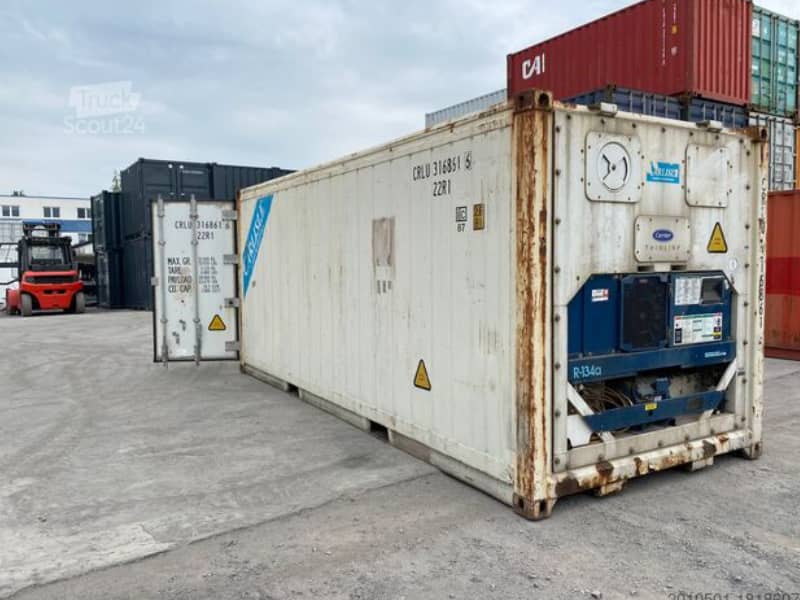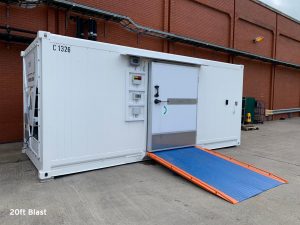All Concerning Freezer Containers: Important Insights for Your Storage Space Demands
Freezer containers play a vital function in the conservation of subject to spoiling goods. They are available in various types, consisting of refrigerated and shielded units, each created for certain storage requirements. Comprehending the advantages and crucial attributes of these containers is crucial for companies aiming to optimize their procedures. As the demand for effective storage remedies grows, discovering the different options offered can bring about notified choices that influence both profitability and sustainability. What elements should one take into consideration when picking the right container?
Sorts Of Cold Storage Containers
Cold store containers come in various kinds, each created to meet certain temperature level control demands. Amongst one of the most common types are refrigerated containers, which keep temperature levels between 0 ° C to 10 ° C, making them appropriate for disposable goods like fruits, veggies, and dairy items. Another kind is the deep fridge freezer container, which operates at temperatures listed below -18 ° C, perfect for long-lasting storage of frozen things such as meats and fish and shellfish.
Protected containers offer temperature stability without energetic air conditioning, making them helpful for short-term transport of temperature-sensitive products. In addition, there are portable freezer units, which use flexibility in places and are commonly utilized in events or seasonal operations. Ultimately, blast chillers swiftly reduce the temperature level of warm foods, ensuring safety and security and high quality. Each kind offers an one-of-a-kind purpose in various markets, from food solution to drugs, emphasizing the value of choosing the appropriate container for particular storage space requirements.

Advantages of Making Use Of Freezer Solutions

In addition, cold store options expand the rack life of products, minimizing waste and enhancing profitability for services. By effectively handling stock with correct temperature control, companies can maximize their supply chains and enhance functional efficiency.
Furthermore, cold store facilities allow for flexible storage space choices, accommodating various volume requirements and seasonal variations sought after (used 40ft refrigerated shipping containers). This flexibility assists companies react swiftly to market adjustments
Lastly, utilizing freezer remedies can assure conformity with health and wellness guidelines, guarding both consumers and businesses. Generally, the strategic usage of freezer boosts item administration while promoting sustainability and economic viability.
Key Attributes to Try To Find in Freezer Containers
When selecting cold storage space containers, a number of essential features merit careful factor to consider to protect peak efficiency and integrity. Initially, temperature level control capacities are essential; containers should maintain regular temperature levels suitable for specific items. Insulation quality also plays a significant function, as premium insulation reduces power usage and boosts temperature level stability.
Next, ease of accessibility and loading is critical; containers ought to provide easy to use styles for efficient handling and organization. Resilience is one more essential element; weather-resistant products guarantee durability and guard materials against ecological elements.
In addition, wheelchair attributes, such as integrated wheels or lifting factors, help with transportation, while personalized layouts allow for customized storage space solutions.
Last but not least, keeping track of systems, consisting of temperature level alarm systems and remote monitoring, provide real-time updates, making particular that problems continue to be optimal. By concentrating on these functions, individuals can choose freezer containers that satisfy their functional demands properly.
Picking the Right Cold Store Container for Your Requirements
Choosing the best cool storage space container needs a thoughtful analysis of certain needs and operational demands. Aspects such as the kind of products being stored, temperature level level of sensitivity, and quantity should be prioritized. As an example, disposable food things might demand containers with rigid temperature controls, while drugs may require accurate problems to preserve efficacy.
Additionally, prospective individuals ought to consider the container's dimension and wheelchair. A bigger device might be essential for mass storage, while smaller, mobile choices could be ideal for short-lived or on-site needs. Insulation top quality and energy performance are additionally essential, as these will certainly influence functional expenses and temperature stability.
Compliance with sector regulations and standards is vital, specifically in industries like food and medical care. By carefully reviewing these elements, users can pick a chilly storage space container that efficiently fulfills their unique needs and warranties optimal storage problems.
Finest Practices for Maintaining Freezer Conditions
Preserving perfect freezer problems is necessary for maintaining the top quality and safety of temperature-sensitive products. On a regular basis monitoring temperature and humidity levels is crucial; making use of trusted electronic thermometers and hygrometers can give exact analyses. Correct insulation of cool storage space containers helps reduce temperature fluctuations and power loss.
Implementing a first-in, first-out (FIFO) system guarantees that older inventory is used before newer supply, reducing waste (used 40ft refrigerated shipping containers). Furthermore, keeping an organized design within the storage space allows for better air flow and decreases the threat of cross-contamination
Regular maintenance checks on devices, such as seals and compressors, are essential to prevent malfunctions. Team training on best techniques here for filling and discharging items assists keep temperature honesty. Lastly, keeping doors shut as long as possible limits heat exchange, ensuring that the freezer setting continues to be stable and reliable in protecting useful products.
Expense Considerations for Freezer Solutions
When examining cold storage services, it is crucial to take right into account the preliminary financial investment expenses alongside continuous operational costs. A thorough malfunction of these expenses can expose considerable lasting savings capacity for services. Understanding these monetary elements aids stakeholders make informed choices regarding their cool storage space needs.

Preliminary Investment Expenses
The monetary landscape of cold store containers presents different initial investment costs that companies must think about. These prices typically include the purchase or rental price of the containers, which can vary based upon dimension, kind, and insulation quality. In addition, costs connected to retrofitting existing structures to fit cold store should be factored in, specifically if specialized devices is required. Installation costs, including electric work and refrigeration systems, also add to the general preliminary financial investment. Businesses need to not ignore transportation expenses for delivering containers to their desired place. Prospective modification choices, such as shelving or temperature monitoring systems, can even more affect the preliminary monetary outlay. Cautious budgeting for these aspects is essential for effective cold store implementation.
Functional Expenses Failure
Functional expenditures for freezer solutions encompass several crucial cost factors to consider that organizations should browse. Key elements consist of power expenses, which can be substantial as a result of the demand to preserve reduced temperatures. Maintenance expenses are additionally substantial, as regular maintenance is important to ensure equipment operates effectively and continues to be compliant with health and wellness criteria. Furthermore, labor expenses may arise from the demand for specialized staff to keep an eye on the storage space and manage atmosphere. Insurance coverage expenses are an additional consideration, as companies need to protect their investments versus potential losses. Any kind of prospective governing compliance prices must be factored in, as organizations might need to invest in systems that stick to food safety and environmental laws. Comprehending these expenditures is critical for reliable budgeting.
Long-Term Financial Savings Prospective
Investing in cold store services provides significant long-term financial savings possibility, transforming preliminary expenses into financial effectiveness over time. By minimizing putridity and waste, organizations can enhance their revenue margins significantly. Advanced insulation and energy-efficient systems lower utility prices, which accumulate over the life expectancy of the equipment. Cool storage space containers commonly require less frequent upkeep compared to standard refrigeration methods, leading to reduced repair work expenditures. The ability to shop items for extended periods without compromising high quality enables organizations to profit from market changes, optimizing income. Additionally, the scalability of freezer options allows firms to adapt to altering demands without incurring extreme costs. In general, these elements add to an engaging case for cool storage as a cost-efficient financial investment strategy.
Regularly Asked Concerns
How Much Time Can Food Be Kept in Cold Storage Containers?
The period food can be kept in freezer containers varies by type. Typically, perishable things last from days to weeks, while frozen foods can remain secure for months, relying on correct temperature level and storage space problems.
Are Cold Store Containers Energy-saving?
The power effectiveness of cold storage space containers varies based on style and insulation high quality. Modern devices typically utilize advanced innovation to lessen power consumption, inevitably adding to decreased functional costs and ecological impact in lasting use.
Can Cold Store Containers Be Customized for Certain Requirements?
Cold store containers can indeed be tailored to fulfill details demands. Alterations may include temperature level controls, dimension changes, and additional features, allowing customers to tailor options effectively for different storage space needs and operational choices.
What Are the Usual Sizes of Cold Storage Containers?
Cold store containers usually come in typical dimensions such as 10, 20, and 40 feet. These measurements suit different storage requirements, making sure adaptability for businesses needing temperature-controlled environments for subject to spoiling goods or sensitive products.
Do Cold Store Containers Require Special Permits for Use?
Cold store containers typically need unique authorizations for usage, relying on neighborhood regulations and planned applications. Authorities might mandate permits to guarantee security standards, ecological compliance, and proper operational techniques are maintained during their application.
Cold storage containers come in various types, each made to satisfy details temperature control requirements. Additionally, cold storage space centers allow for versatile storage alternatives, fitting numerous quantity demands and seasonal changes in need. Choosing the right cool storage space container needs a thoughtful assessment of details requirements and operational demands. The economic landscape of cold storage space containers provides various first investment costs that businesses have to think about. Cold storage containers can without a doubt be personalized to meet certain requirements.